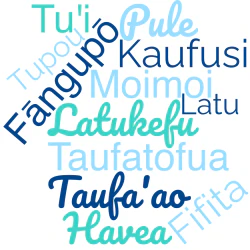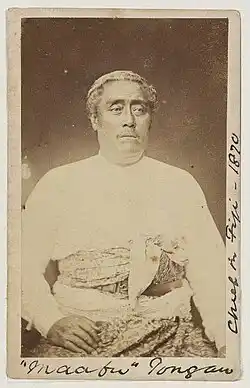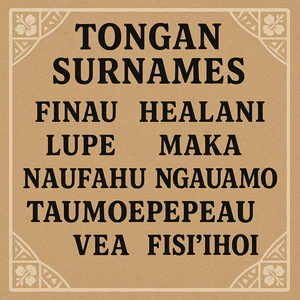
Tongan surnames are those carried by individuals of Tongan ethnicity, as well as other people living in the island country of Tonga. This is a small archipelago in the South Pacific Ocean, directly south of Samoa. Tonga has about 100 islands, the largest island being Tongatapu. It is the only Pacific country to have never been colonised[1].
Tonga's current population is around 100,000, while the Tongan Diaspora is about another 150,000 people. These are concentrated in New Zealand, the United States and Australia[2].
Tongan names carry deep cultural significance, connecting individuals to their lineage, land and history. Traditional forms of identification have always central to Tongan society. But the widespread adoption of fixed, hereditary surnames in the Western sense is a relatively more modern development reflecting historical, social and cultural changes as Tongan became more open to the wider world[3].
History of Tongan surnamesHistory of Tongan surnames
Pre-Colonial Identification: Before the widespread use of fixed surnames, Tongans primarily identified themselves through their oral genealogies (tohohoko), which traced lineage back through many generations. An individual's connection to their kāinga (extended family and kin group), specific ancestors, and sometimes their locality or island, formed the basis of their identity. Tatatau (traditional Tongan tattoos) were also significant markers of identity, genealogy, and social standing. They often evoked a sense of belonging, responsibility and faka'apa'apa (respect) for a person's family and origins. The collective nature of Tongan society means that an individual's actions reflect on their family and their family's name.
Influence of Monarchy, Nobility, and the 1875 Constitution: The establishment of the Kingdom of Tonga and its Constitution in 1875 played a crucial role in formalizing names, particularly for the hou'eiki (nobility). Hereditary noble titles, granted by the monarch, often became akin to surnames for these families, linking them to specific lands and responsibilities.
Western Influence and Formalisation: Contact with Western cultures, including missionaries and administrative systems, further encouraged the adoption of hereditary patrilineal surnames for broader official and legal purposes. This helped in record-keeping and aligned with Western naming conventions. While surnames became more fixed, the importance of the kāinga and traditional kinship ties remained paramount.
Enduring importance of Tongan surnames in Tongan society and cultureEnduring importance of Tongan surnames in Tongan society and culture

Many Tongan families maintain genealogical relationship charts, known as hohoko, which meticulously record the names of their ancestors, descendants and other relatives[4].
Prior to the advent of written records oral genealogies were the primary and most vital method of preserving family information, passed down through generations. These oral traditions continue to be valuable resources for genealogical researchers today. Hundreds of Tongan oral histories and genealogies having been collected and transcribed, demonstrating the enduring cultural value placed on ancestral knowledge and lineage which extends beyond the documents themselves. Oral tradition therefore complements, and validates, written forms. This highlights a cultural resilience where new practices are integrated without fully displacing traditional ones[5].
Tongan surname conventions and challengesTongan surname conventions and challenges

In Tonga, the use of double surnames is common, in which a person bears both his father's and his mother's surname. This pattern reflects the importance of both lineages and underlines the diversity and respect towards the two families involved. This fact is particularly relevant in cultural heritage, as it allows the stories of both sides of the family to be kept alive through generations[6].
Like Tongan words in general Tongan surnames follow the phonological rules of the Tongan language[7]. This typically means syllables end in a vowel, and there are specific rules for consonant usage (e.g., 'ng' is a single sound). Surnames are generally single words. In common with many Western cultures Tongan names are written with the first name followed by the surname: for example, Anitelu Taumalolo.
The early period of surname adoption presented significant challenges, primarily due to the absence of prior written language and standardised naming conventions. Neither given names nor newly adopted family surnames were initially standardised or made permanent. It was common for the same person's name to be rendered differently by various branches of their family, leading sometimes to inconsistencies in written and oral records[8].
Tongan surnames of patronymic originTongan surnames of patronymic origin
Tongan surnames are now generally patrilineal, meaning they are passed down from the father to his children[9]. However, the historical context shows that a nobleman or the King could also bestow a new surname upon an individual, thereby establishing a new family identity tied to that chiefly or royal connection.
While surname inheritance is patrilineal, the broader Tongan kinship system also has strong matrilineal elements. For instance, the mehekitanga (the father's eldest sister) holds a position of high respect and traditionally had the honour of naming her brother's children (usually their given names, not surnames).
Tongan surnames of toponymic originTongan surnames of toponymic origin
Tongan surnames can indicate the region to which a person belongs and often indicates the village one comes from. This reflects the strong connection between family identity and place of origin in Tongan culture.
Tongan surnames of aristocratic originTongan surnames of aristocratic origin
Certain names are only allowed to be given to members of the royal family. Once a Tongan obtains a hereditary title, they will be referred to by that title and no longer by their given name. Such titles are usually for life, but the holder can be stripped of it if they commit a serious crime. In this case, they will return to their original name.
Tongan surnames of foreign originTongan surnames of foreign origin
With the colonisation process in the 19th century, Tonga experienced a significant change to both its political structure and in the adoption of foreign-style surnames. Interactions with missionaries, traders, and colonisers resulted in the introduction of new surnames that over time became intertwined with indigenous surnames. This influence has led to a diversity in surnames, with many Tongans adopting surnames of European or other foreign descent.
Today, despite Tonga’s relatively small population, there are about 2,074 unique surnames in Tonga with approximately 51 people per name. This highlights the considerable diversity in family names across the islands.
Most common Tongan surnamesMost common Tongan surnames
Below is a list of the most common indigenous surnames in Tonga, along with a brief description of their generally accepted origin and meaning[10].
- Fifita - A common Tongan surname. It is strongly associated with Tongan heritage and embodies values such as community, respect, and resilience.
- Finau - Means "warrior" or "chief," signifying strength, leadership, and courage.
- Fonua - Means "land" or "earth." This surname reflects a deep connection to one's roots, heritage, the land, and community.
- Fāngupō - Literally, it translates as “those who come from the land” and may be associated with people from certain geographic areas of Tonga.
- Havea - A well-known Tongan surname, often associated with chiefly lines.
- Langi - Can mean "sky" or "heavens" and is often associated with nobility.
- Latu - Can mean "God of the wind." It is also said to signify a connection to heritage, lineage, and tradition. The name has strong origins in the Ha'apai island group.
- Ofa - This surname means love in Tongan and is a common name that reflects the importance of family and community ties.
- Pule - This surname has origins in the political system and can refer to authority or leadership within the community.
- Tā‘ata - A surname that may have links to ancestral stories or local gods, underscoring the spiritual connection that the people have with their land.
- Taufa / Taufa'ao - The name Taufa is associated with a traditional Tongan sea god. Surnames like Taufa'ao likely relate to this connection.
- Tu'i - This surname represents nobility and may be linked to kings or tribal chiefs, showing royal lineage in Tonga.
- Tupou - A surname of royal significance, directly linked to the Tongan monarchy and meaning "royal title" or referring to the King/Queen[11].
- Uluaki - Meaning "first" or "leader."
In addition to the above there are other surnames whose direct etymological meaning is unclear, but which are common in Tonga[12]. Examples include:
Celebrities with Tongan surnamesCelebrities with Tongan surnames

Relative to the country's small population Tongan has produced several prominent individuals, especially in the rugby football codes and other sports:
- Filo Tiatia: New Zealand rugby union player of Tongan background.
- Futa Helu: Prominent Tongan philosopher and educator.
- Lorde: stage name for Ella Marija Lani Yelich-O’Connor, Grammy-awarding New Zealand singer-songwriter of Tongan heritage.
- Alipate Fifita: Well-known Tongan professional wrestler better known as Tama Tonga, former WWE Tag Team Champion.
- Fuifui Moimoi: International rugby league player.
- Pita Taufatofua: Tongan taekwondo Olympic athlete, also known for his work as a model and his advocacy for various causes.
- Tupou VI: Member of Polynesian royalty born as ʻAhoʻeitu, who began his reign as King of Tonga in early 2012, having previously served as both Prime Minister of Tonga and Tongan High Commissioner to Australia.
- Tevita Fitita: Tongan international rugby union player.
- Uli Latukefu: Australian actor and singer of Tongan background who has gained prominence from starring roles in several Hollywood movies and Netflix series.
See alsoSee also
- Kanak surnames
- Maori surnames
- Hawaiian surnames
- New Zealand surnames
- Indigenous Australian surnames
- German surnames
- British surnames
- Danish surnames
- Arabic surnames
- Polish surnames
- Afrikaans surnames
- Greek surnames
- Portuguese surnames
- Latvian surnames
- Lithuanian surnames
- Ashkenazi Jewish surnames
- Chinese surnames
- Alsatian surnames
- Indian surnames
- Silesian surnames
- Scottish surnames
- Welsh surnames
- Canadian surnames
- American surnames
- Irish surnames
- French surnames
- Dutch surnames
Explore more about Tongan surnamesExplore more about Tongan surnames
You can explore more about Tongan surnames in MyHeritage's birth and death records, immigration documents and other historical record collections. MyHeritage's databases include over 14,000 Tongan records.
Other online sources to review include:
- Most common Tongan surnames on the website Surnames of the World.
- Tonga Naming Customs on the FamilySearch website under the auspices of the Church of the Latter-Day Saints. The FamilySearch website includes a range of other specialist databases on Tongan genealogy which can assist with surname research. This includes a Genealogical chart of the royalty of Tonga.
- Tongan Last Names, part of the website, Our Public Records. This site also includes a summary of the most common prefixes or suffixes in Tongan last name and their generally understood meanings.
References
- ↑ Tonga - A brief history. RNZ. (n.d.).
- ↑ Wikimedia Foundation. (2025a, April 17). Demographics of tonga. Wikipedia.
- ↑ Tonga. Tonga: Pacific Islands, Goal 1. (n.d.).
- ↑ Pier. (n.d.). Tongan - family. Cultural Atlas.
- ↑ FamilySearch Wiki. (2024, August 12). Tonga compiled genealogies.
- ↑ Tonga surname/last name: Meaning, Origin & Family History. (n.d.-a).
- ↑ Wikimedia Foundation. (2025b, May 27). Tongan language. Wikipedia.
- ↑ Oral genealogies in the Pacific Islands: Religious studies center. Oral Genealogies in the Pacific Islands | Religious Studies Center. (n.d.).
- ↑ Wikimedia Foundation. (2024, March 8). Category:surnames of Tongan origin. Wikipedia.
- ↑ Common last names by country 2025. worldpopulationreview.com. (n.d.).
- ↑ Tupou meaning: Tongan term for royal title - onelook. (n.d.-b).
- ↑ Most common Tongan surnames: Discover the most common surnames in Tonga. surnam.es. (n.d.).

